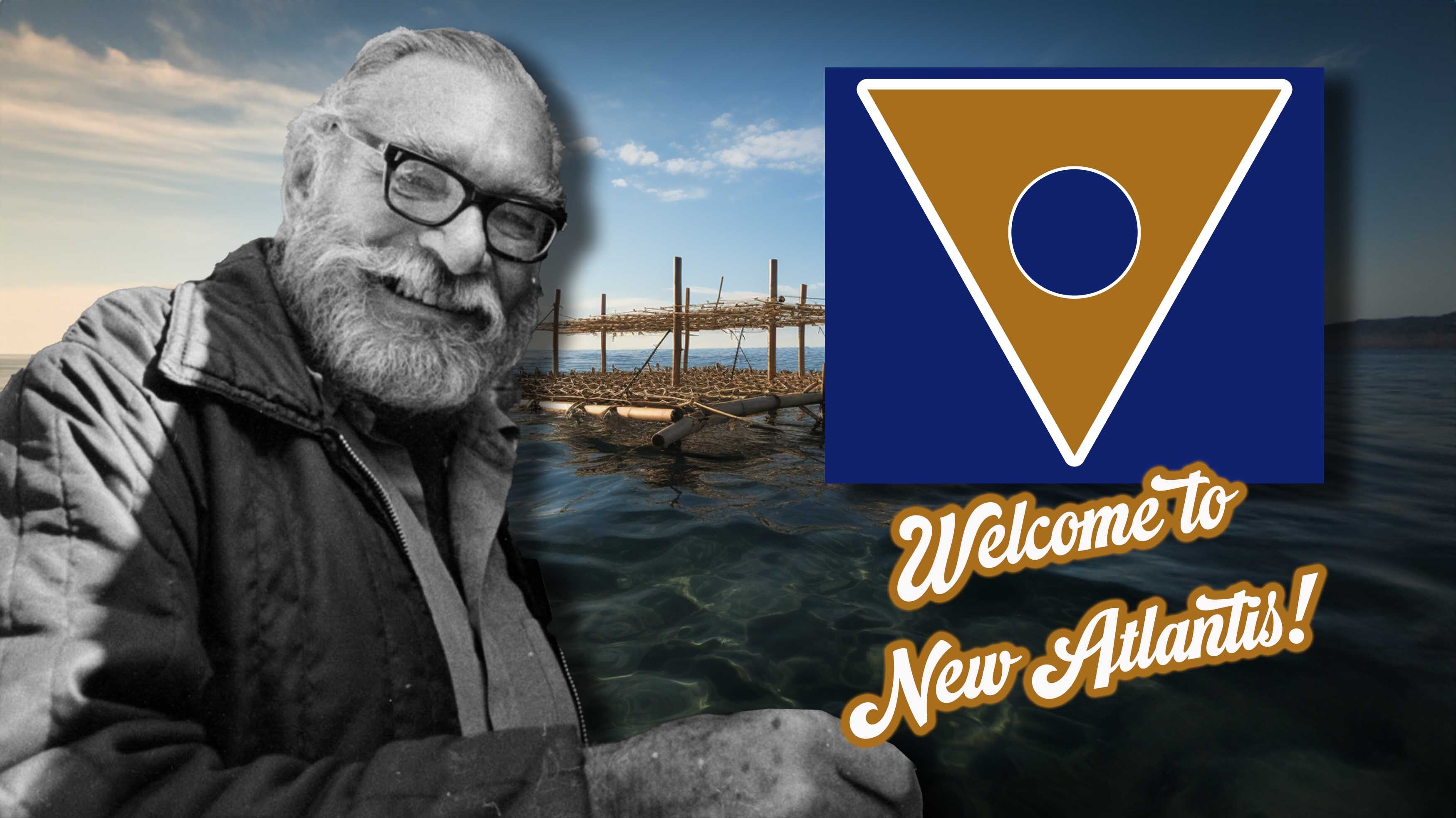New Atlantis and the Other Hemingway
Imagine tying a bunch of rafts together, floating it in the ocean, and then claiming it was an independent island nation. That’s exactly what Ernest Hemingway’s youngest brother, Leicester did in 1964. In this episode, we learn about his quest to establish the island nation of “New Atlantis.” Then we chat with the guy behind “614 Feast,” Anthony O’Connell.

The Lost City of Atlantis. It’s been the subject of countless works in print and film. And most likely completely fictional, invented by Plato in the 5th century in order to teach philosophy. According to him, the city existed 9,000 years before he was born. It was described as an island with all the worlds pleasures you could imagine. To this day, many believe that it actually existed and sank into the sea – possibly somewhere near the rock of Gibraltar. Other theories put the lost city in the Mediterranean, the Azores or even under Antarctica.
It was said to be built by Poseidon himself to protect his love with a mortal woman, Cleito. Most experts agree that the island city and its many legends are completely fictional, but some people, like Ocean Explorer Robert Ballard believe that the legend lines up with a massive ancient volcanic eruption that happened near Greece.
If you want my opinion, there was never an Atlantis. It’s fun to theorize about and imagine, but no modern technology has ever been able to find anything that fits the description. It’s much more likely that Atlantis was used by Plato when teaching philosophy and the concept of an ideal city.
If Atlantis really existed, it would most likely be what’s known as a micro-nation: a political entity that claims independent status and freedom from the rest of the world. There are lots of examples of these. Sea-land, a weird thing off the coast of the United Kindgom is one I intend on covering in a future episode. But the one we’re talking about today got its name from Plato’s mythical lost island of Atlantis.
Leicester Hemingway was born 16 years after his brother Ernest – he was the youngest of 6 siblings. While his older brother Ernest went on to become one of the most famous novelists in the world and was awarded a Nobel Prize in Literature, his younger brother Leicester was an author in his own right but never saw huge success or fame. He wrote six books, including titles like “The Sound of the Trumpet” which was written using his own experiences in World War II. It wasn’t incredibly well received. Leicester also wrote a memoir about his brother Ernest, and wanted the official stamp of approval from his famous sibling but the two had become estranged and he was denied. His memoir, “My Brother, Ernest,” was published in 1962 after Ernest’s death. It was well-received and his most profitable work.
Leicester Hemingway looked a lot like Ernest and often tried to cash in on the tie with his brother, something that likely strained their relationship in Ernest’s later years.
The year after his memoir was published, Leicester began a project that was his strangest. The founding of a nation: A new Atlantis.
The Guano Islands Act of 1856 was a United States Federal law that was codified by Congress that allows citizens of the US to take possession of unclaimed islands in the name of the U.S. if and only if those islands contain guano deposits. In other words, if they have large amounts of poop from bats or seabirds, they could be claimed. I know this seems super strange. It turns out that guano was a pretty important resource for a time in history. The U.S. was importing 760,000 tons of the stuff by the 1850s. So the Guano Islands Act helped to secure and protect these resources – even giving the President of the United States the power to send in the military to intervene if needed. The U.S. gained control of around 94 islands using this act, 66 of which were eventually recognized as U.S. territories. It’s still a law and there are – to this day – 10 U.S. territories that came about as a result of the Guano Islands Act, including some you may have heard of like Midway Atoll and Johnston Atoll. Some of these claims have been denied over the years and some are still in dispute. For example, in 1997, Navassa Island was claimed under the Act and while it’s still a de facto U.S. controlled island, Haiti has claimed the island as theirs. One of the strange parts of this is that a U.S. citizen could claim up to half of the land if an island were claimed.
It was this act – the Guano Islands Act of 1856 that Leicester Hemingway used to establish his private island – if you could call it that. It was 1964 and he had made a bit of money from publishing his memoirs about his older brother Ernest.
He had this crazy idea to establish an island. The idea first came to him as the plot of a novel, but why not create it for real? Did he find a piece of land somewhere that was uninhabited? No. He tied together a bunch of rafts. The entire area of the rafts was something like 8 feet wide by 30 feet long. And on July 4th of 1964, he sailed them out to an area 6 miles off the Southwest coast of Jamaica. There was a sand bar in the middle of the ocean. The surrounding ocean was around 1,000 feet deep in that area, but this sand bar made it quite a bit shallower there. He took an old Ford car engine and tied it to a rope, tied the other end to his raft and thus was anchored in place. So can something like this be considered an island?
Well lets look at examples of other islands. First of all, the idea of a floating island isn’t something new. There are floating islands on almost every continent. The Maldives is a floating island. But it’s natural. What about man made? Can an island be man-made? Well Flevopolder in the Netherlands is man-made and it’s the largest man-made island. It’s even considered it’s own province. But it’s still made of earth. Another example would be the New Doha Airport in Qatar, also known as the Hamad International Airport. It’s a man-made floating island. So is the Hong Kong Airport. So what if Leicester’s island was made of bamboo, steel, iron piping and rocks. In his eyes, it met the definition of an island.
I don’t know how he did it, but he convinced other people to live on the raft island with him and he called it, prophetically – New Atlantis. It helped that his 2 daughters and his wife were 3 of the 6. Leicester made 4 and the other two were Edward Moss, his Public Relations specialist and his assistant Julia Cellini. So New Atlantis had 6 permanent residents and even had it’s own flag, a dark blue flag with an upside down gold triangle and blue circle. He claimed half of the island for the United States under the Guano Islands Act and the other for himself and his co-inhabitants and had lots of plans for this island. He planned on – over time – dropping rocks and sand into the ocean underneath him to eventually make the raft connected to the ground by more than the old makeshift car engine anchor. He also at one point mentioned that he wanted to sink a hull from a tanker to fill with sand. His long-term plan was for New Atlantis to be a Oceanic Research Station. He even applied for funding from the United States for this research, but was denied.
Hemingway financed this entire project with $80,000 worth of book sales, but eventually that would run out, so his new plan was to sell stamps. He designed a stamp and had a batch of 200,000 printed which were eventually completely disregarded by the Universal Postal Union. They were worth nothing. One of these stamps was even mailed to United States President Lyndon Johnson. When Johnson returned a letter referring to Hemingway as “Acting President,” he used that to further claim validity of his island. Jamaican press had taken note of the claim and he received quite a bit of press coverage about New Atlantis – even back in the states. I found a newspaper clipping from the Tampa Tribune from September of 1964. The focus is on First Lady of New Atlantis, Doris Hemingway. In the article, she is quoted as saying “The official activities are swim, fish, gaze – in whatever order one prefers.” The article, which seems to take the island nation very seriously, says “New Atlantis” is to be a republic in every sense of the word – once it gets bigger…when it grows, a hotel and restaurant are planned.”
The official currency, as deemed by Hemingway, was called the Scruple. A stamp came in 100 and 200 scruple denominations and he had plans for the future to actually mint scruple coins. His next big step was to acquire diplomatic recognition from the world powers and then eventually apply to the United Nations.
However. Before he had a chance to do any of that, just a couple years after the project began, a tropical storm blew through and completely destroyed New Atlantis and everything on it. The dream was dead. But what remains is a story of an eccentric man with a crazy dream. Oh and the artifacts. To this day, artifacts from New Atlantis have been preserved in the Harry Ransom Center in Austin, Texas. They have the New Atlantis flag, hand sewn by Doris, some postage stamps, and what was left of the beginnings of their typed out constitution.
Sadly, Leicester ended his own life with a shotgun in 1982 – the same fate as his father and his brother Ernest. Doris lived to be 68 and died in 1997.
The Guano Islands Act is still in place and valid. So if you ever want to start a new island nation – and you want to get further than Leicester Hemingway – all you need is some rafts, maybe a few bribes to officials to help secure your nation status, a sturdy way to weather the storms and a pile of bat guano. The Internet Says it’s True.

Review this podcast at https://podcasts.apple.com/us/podcast/the-internet-says-it-s-true/id1530853589
Bonus episodes and content available at http://Patreon.com/MichaelKent
For special discounts and links to our sponsors, visit http://theinternetsaysitstrue.com/deals

